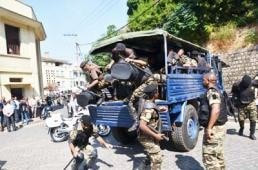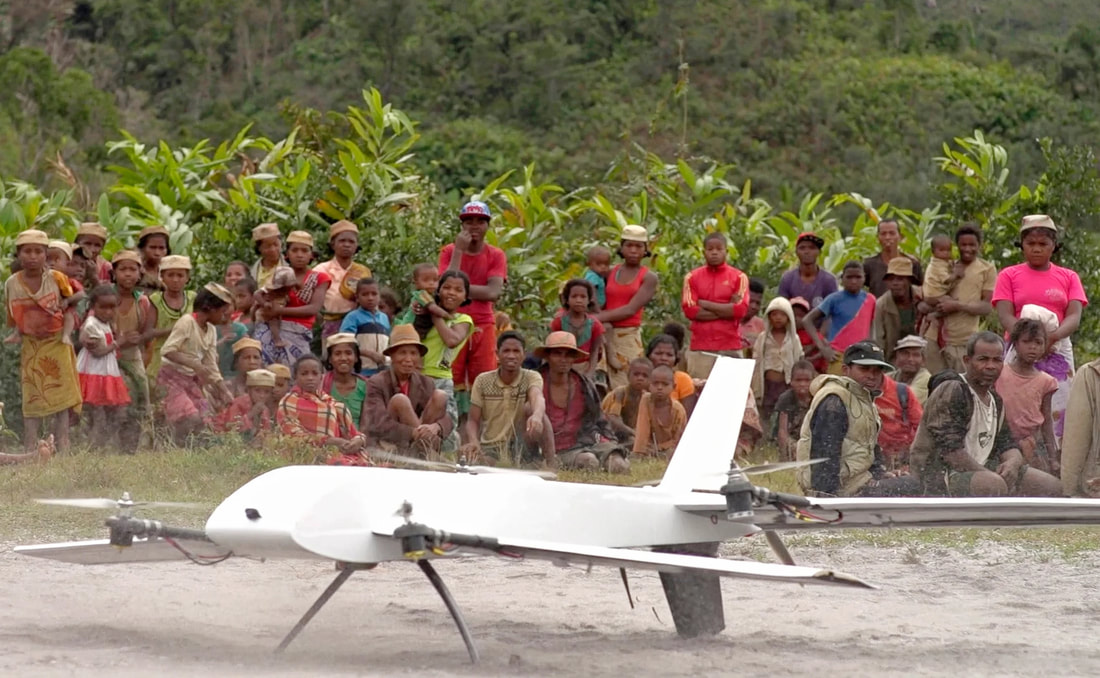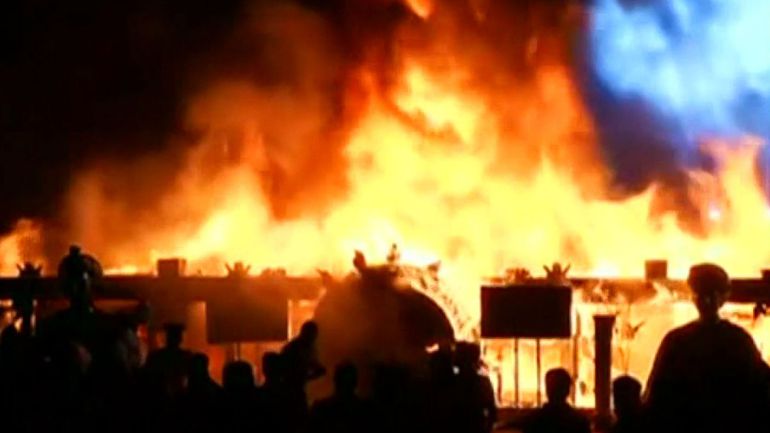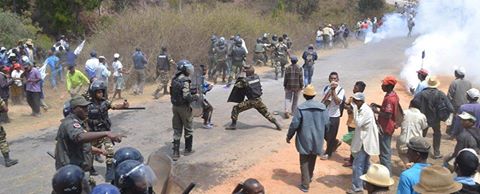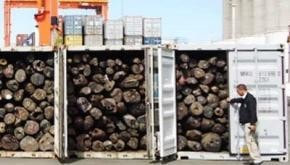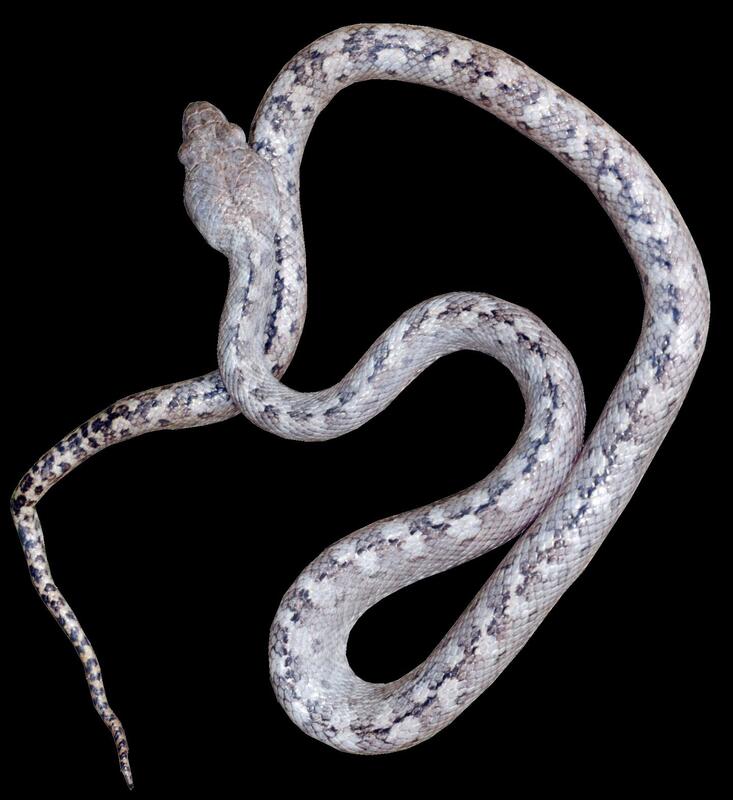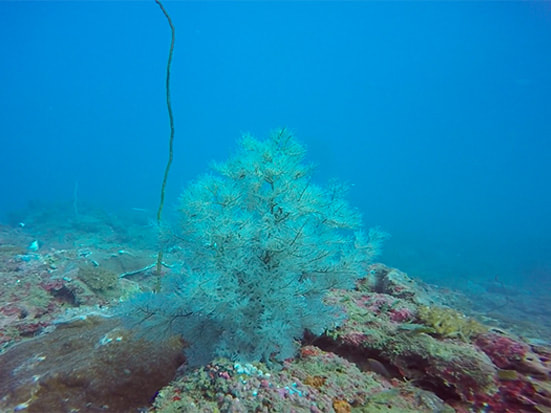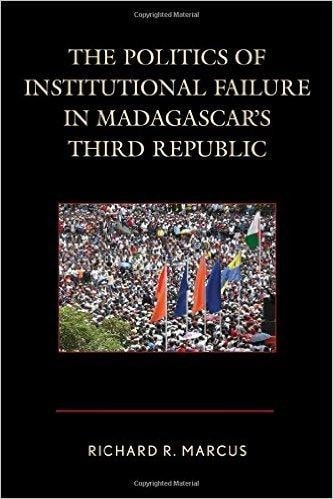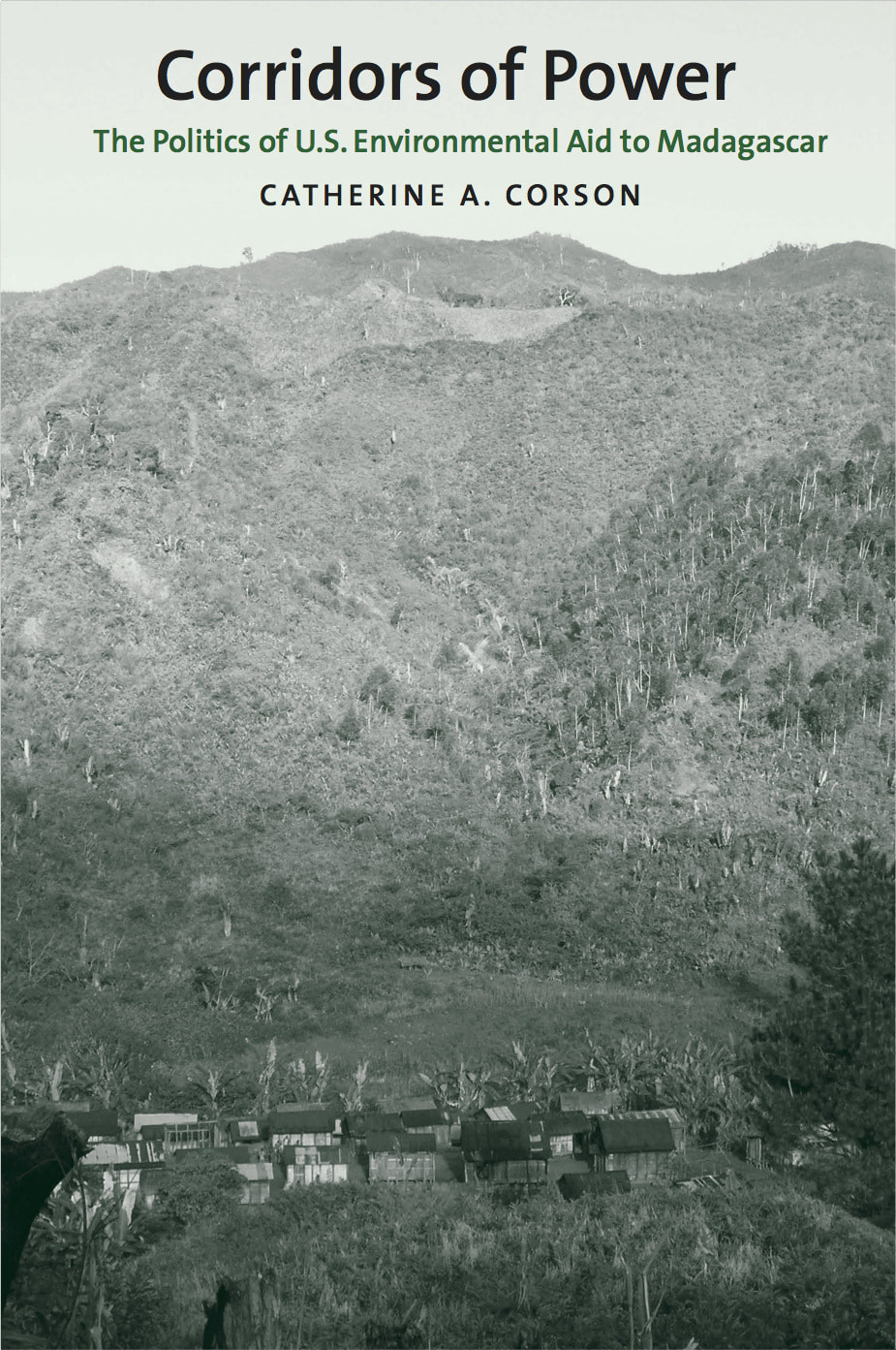Anglo-Malagasy Society Newsletter 93: September 2016 |
| ||
Society activities
The Society’s second meeting for 2016 on 22nd June was both an occasion to commemorate the country’s Independence Day on 26th June and an opportunity to hear two talks by Malagasy students currently at the School of Oriental and African Studies (SOAS) in London. Zohasina Razafinjatovo, who is a Chevening scholar of Law, Development and Governance, spoke on social development and inequality in Madagascar with a focus on governance and legislation while Lalaina Randriarimanana, who is a student of Violence, Conflict and Development, presented on patterns of political participation in Madagascar.
The third Society event this year will be a daytime gathering on Saturday 22nd October when there will be five short talks on Madagascar: Herizo Andrianandrasana on conservation projects, Romy Voos on oil and sustainability, Andrew Cooke on small-scale mining and biodiversity, Nanja Raobison on education and Michael Rakotoarivony on the development of classical music in the country. The musician Olga del Madagascar will play and there will be a Malagasy buffet lunch.
There are details on our website, which also has a summary of some of the previous talks for those unable to attend, together with much other useful information. This includes directions to the venue for our meetings, which is the Upper Vestry Hall of St George’s Church, Bloomsbury, London WC1A 2HR, two minutes’ walk from the British Museum.
The next newsletter will be published in September 2016. Please send any material for inclusion as well as any changes in your contact details to the editor Julian Cooke, whose e-mail address is [email protected].
It is with sadness that we learned that Dennis Amy OBE CMG, a former Ambassador to Madagascar and member of the Society, had passed away. He was in Madagascar at a fascinating if challenging time and spoke with affection of that posting. He brought a warmth of personality to the meetings he attended and made an appreciable contribution to the Society.
The third Society event this year will be a daytime gathering on Saturday 22nd October when there will be five short talks on Madagascar: Herizo Andrianandrasana on conservation projects, Romy Voos on oil and sustainability, Andrew Cooke on small-scale mining and biodiversity, Nanja Raobison on education and Michael Rakotoarivony on the development of classical music in the country. The musician Olga del Madagascar will play and there will be a Malagasy buffet lunch.
There are details on our website, which also has a summary of some of the previous talks for those unable to attend, together with much other useful information. This includes directions to the venue for our meetings, which is the Upper Vestry Hall of St George’s Church, Bloomsbury, London WC1A 2HR, two minutes’ walk from the British Museum.
The next newsletter will be published in September 2016. Please send any material for inclusion as well as any changes in your contact details to the editor Julian Cooke, whose e-mail address is [email protected].
It is with sadness that we learned that Dennis Amy OBE CMG, a former Ambassador to Madagascar and member of the Society, had passed away. He was in Madagascar at a fascinating if challenging time and spoke with affection of that posting. He brought a warmth of personality to the meetings he attended and made an appreciable contribution to the Society.
Politics in Madagascar
The last three months in Madagascar have seen some continued tension and challenges.
Madagascar’s Independence Day celebrations on 26th June were marred by the death of three young people when a bomb exploded at the Mahamasina stadium. The attack prompted a raft of accusations and some conspiracy theories. The tension continued into July when security forces surrounded the house of former prime minister Monja Roindefo, the head of MONIMA, who had been vocal in calling for the perpetrators to be brought to justice, and the questioning of a cameraman at the TV station VIVA, who has not attended the ceremony although accredited to do so.
A number of journalists launched a protest outside the National Assembly against proposed legislation that they claimed would restrict free speech and which the Ministry of Communication said had been discussed widely and had the support of the international community; the US ambassador, Robert Yamate, said that the Malagasy people needed to be engaged and informed. The bill was deferred by a vote of 46 deputies to 18. The Assembly was prolonged into an extraordinary session to consider the bill and another proposing a special court for financial delinquency.
This new session of the Assembly started on 4th July and the protests continued. The United Nations was involved in establishing a dialogue and there was an unsuccessful meeting between deputies and journalists, although after a commission made a number of changes, including a reduction in the potential prison sentence for cybersecurity crimes, the revised law was passed by 80 deputies to one. The journalists’ association planned further protests while Reporters Sans Frontieres criticised the new law. The head of the Haute Cour Constitutionelle (HCC), Jean-Eric Rakotoarisoa, was asked to intervene; his position was a little awkward as was an editorial director at the weekly magazine Dans les Médias Demain. The Assembly passed the law at a second reading on 14th July while in August the HCC opined that the law was in conformity with the constitution and only called for one article to be amended in line with the African charter on human rights.
At the beginning of July the electoral commission CENI set out its objective to achieve a standard of credible and democratic governance. It has a particular target of inscribing 10 million voters by December, an increase of 1.4m on the current level, and will have an important role in the presidential elections due in 2018. The prime minister, Olivier Mahafaly, told the European Union that provincial and regional elections would take place in 2017.
Marc Ravalomanana was on 3rd July the first candidate to declare officially that he would be standing for president. He had a meeting with the French foreign ministry at the Quai d’Orsay on 11th July and said after a Bastille Day reception at the French embassy that he no longer had any problem in his relations with France.
Ravalomanana’s party TIM was not included in sixteen groups under the name of Mitsanganary Malagasy (MRM - Onward Malagasy) which called on President Hery Rajaonarimampianina to stand down and which did comprise supporters of the former head of state Andry Rajoelina.
The former prime minister Omer Beriziky in turn called on the Malagasy to stand up to what he called the despoliation of Madagascar for personal interests and the benefit of a single party.
The preparations for the summit of Francophone countries in November continued with an assembly of some 300 parliamentarians held under tight security, which was prolonged after the event. The five-star hotel that will host the summit is being refurbished at an estimated cost of $28m while a new airport highway is being built by a Chinese company, with extensively Chinese workers, at a cost of €43m. There have been increased concerns over an apparent expansion of radical Islam in the country (and a Malagasy man was arrested in France on suspicion of links to Islamic State and extradited in June), although it has not been associated with the attacks in June.
In mid-July an episcopal mission from the Catholic Church named ‘Justice and Peace’ deplored the state of affairs in the country and the state of fear in which the populace lived. However, the prime minister rejected calls to hold further round-table discussions on the structure of the state amid indications that the bishops favoured a set-up similar to that in 1991 when Albert Zafy had assumed some of the authority of Didier Ratsiraka.
The Minister of Foreign Affairs, Béatrice Attalah, reacted strongly to the moves by the Turkish ambassador to designate two institutes as terrorist organisations linked to Fettulah Gülen although the anti-corruption body SEMAFIN did launch an investigation.
On 10th August Omer Beriziky announced that he would stand for president in 2018 and there were increasing expectations that Andry Rajoelina would do the same. A new entity Antso ho an’ny fanavotam-pirenena (AFP – Appeal to Save the Nation) called for a street protest on 19th August which they said was to protest at poverty rather than to prompt a change in power. The plan received mixed support and was largely pre-empted by a heavy Gendarmerie presence. Omer Beriziky, part of a linked movement called Dinika ho fanavotam-pirenena (DFP) gave the President a deadline of 22nd September to organise a national dialogue. The opposition platform MRM garnered increasing support over the month of August including from Andry Rajoelina’s MAPAR and four other parliamentary groups.
A conference of Catholic bishops on 12th August despaired of the state of the nation and was critical both of the government and the opposition for being self-enriching and for leaving the country in poverty. By contrast the eighteenth synod of the FJKM, the association of Protestant churches, which took place in Antsirabe from 17th to 24th August, made less comment on the state of the country, perhaps not surprisingly given the prominent positions in its hierarchy of Rajaonarimampianina and Ravalomanana, who was given a place on the committee organising the 50th anniversary celebrations of the FJKM in 2018. The theologian Pastor Irako Ammi was elected president and the meeting did call for an end to corruption and insecurity.
Joaquim Chissano returned to Madagascar on 16th August after an absence of three years to enquire into the state of economic and political affairs as a special envoyé of the SADC.
On 23rd August the President told a number of journalists that he had already passed the law on media communication and that the issue was closed, in spite of continued protests.
Madagascar’s Independence Day celebrations on 26th June were marred by the death of three young people when a bomb exploded at the Mahamasina stadium. The attack prompted a raft of accusations and some conspiracy theories. The tension continued into July when security forces surrounded the house of former prime minister Monja Roindefo, the head of MONIMA, who had been vocal in calling for the perpetrators to be brought to justice, and the questioning of a cameraman at the TV station VIVA, who has not attended the ceremony although accredited to do so.
A number of journalists launched a protest outside the National Assembly against proposed legislation that they claimed would restrict free speech and which the Ministry of Communication said had been discussed widely and had the support of the international community; the US ambassador, Robert Yamate, said that the Malagasy people needed to be engaged and informed. The bill was deferred by a vote of 46 deputies to 18. The Assembly was prolonged into an extraordinary session to consider the bill and another proposing a special court for financial delinquency.
This new session of the Assembly started on 4th July and the protests continued. The United Nations was involved in establishing a dialogue and there was an unsuccessful meeting between deputies and journalists, although after a commission made a number of changes, including a reduction in the potential prison sentence for cybersecurity crimes, the revised law was passed by 80 deputies to one. The journalists’ association planned further protests while Reporters Sans Frontieres criticised the new law. The head of the Haute Cour Constitutionelle (HCC), Jean-Eric Rakotoarisoa, was asked to intervene; his position was a little awkward as was an editorial director at the weekly magazine Dans les Médias Demain. The Assembly passed the law at a second reading on 14th July while in August the HCC opined that the law was in conformity with the constitution and only called for one article to be amended in line with the African charter on human rights.
At the beginning of July the electoral commission CENI set out its objective to achieve a standard of credible and democratic governance. It has a particular target of inscribing 10 million voters by December, an increase of 1.4m on the current level, and will have an important role in the presidential elections due in 2018. The prime minister, Olivier Mahafaly, told the European Union that provincial and regional elections would take place in 2017.
Marc Ravalomanana was on 3rd July the first candidate to declare officially that he would be standing for president. He had a meeting with the French foreign ministry at the Quai d’Orsay on 11th July and said after a Bastille Day reception at the French embassy that he no longer had any problem in his relations with France.
Ravalomanana’s party TIM was not included in sixteen groups under the name of Mitsanganary Malagasy (MRM - Onward Malagasy) which called on President Hery Rajaonarimampianina to stand down and which did comprise supporters of the former head of state Andry Rajoelina.
The former prime minister Omer Beriziky in turn called on the Malagasy to stand up to what he called the despoliation of Madagascar for personal interests and the benefit of a single party.
The preparations for the summit of Francophone countries in November continued with an assembly of some 300 parliamentarians held under tight security, which was prolonged after the event. The five-star hotel that will host the summit is being refurbished at an estimated cost of $28m while a new airport highway is being built by a Chinese company, with extensively Chinese workers, at a cost of €43m. There have been increased concerns over an apparent expansion of radical Islam in the country (and a Malagasy man was arrested in France on suspicion of links to Islamic State and extradited in June), although it has not been associated with the attacks in June.
In mid-July an episcopal mission from the Catholic Church named ‘Justice and Peace’ deplored the state of affairs in the country and the state of fear in which the populace lived. However, the prime minister rejected calls to hold further round-table discussions on the structure of the state amid indications that the bishops favoured a set-up similar to that in 1991 when Albert Zafy had assumed some of the authority of Didier Ratsiraka.
The Minister of Foreign Affairs, Béatrice Attalah, reacted strongly to the moves by the Turkish ambassador to designate two institutes as terrorist organisations linked to Fettulah Gülen although the anti-corruption body SEMAFIN did launch an investigation.
On 10th August Omer Beriziky announced that he would stand for president in 2018 and there were increasing expectations that Andry Rajoelina would do the same. A new entity Antso ho an’ny fanavotam-pirenena (AFP – Appeal to Save the Nation) called for a street protest on 19th August which they said was to protest at poverty rather than to prompt a change in power. The plan received mixed support and was largely pre-empted by a heavy Gendarmerie presence. Omer Beriziky, part of a linked movement called Dinika ho fanavotam-pirenena (DFP) gave the President a deadline of 22nd September to organise a national dialogue. The opposition platform MRM garnered increasing support over the month of August including from Andry Rajoelina’s MAPAR and four other parliamentary groups.
A conference of Catholic bishops on 12th August despaired of the state of the nation and was critical both of the government and the opposition for being self-enriching and for leaving the country in poverty. By contrast the eighteenth synod of the FJKM, the association of Protestant churches, which took place in Antsirabe from 17th to 24th August, made less comment on the state of the country, perhaps not surprisingly given the prominent positions in its hierarchy of Rajaonarimampianina and Ravalomanana, who was given a place on the committee organising the 50th anniversary celebrations of the FJKM in 2018. The theologian Pastor Irako Ammi was elected president and the meeting did call for an end to corruption and insecurity.
Joaquim Chissano returned to Madagascar on 16th August after an absence of three years to enquire into the state of economic and political affairs as a special envoyé of the SADC.
On 23rd August the President told a number of journalists that he had already passed the law on media communication and that the issue was closed, in spite of continued protests.
|
In his address to the UN General Assembly on 23rd September President Rajaonarimampianina highlighted the need to meet commitments on global development and gender equality as well as the investment opportunities in the country. He also discussed the proposed talks with France on the disputed Iles Eparses. Meanwhile in the country SEFAFI, in its capacity as the observer on public life, criticised the nature of an all-powerful presidency. There has also been a degree of criticism of the apparent impunity of the forces of law and order.
|
Economic and social matters
Finance and aid
On 27th July the IMF approved a $305m facility for Madagascar of which a little over a tenth would be disbursed immediately. The Malagasy government will hold a meeting with donors and potential investors in Paris on 1st-2nd December at which it hopes to secure $3.4bn of commitments.
The state utility JIRAMA finally moved in July to increase electricity prices, by 9% for the public and by 15-20% for businesses. The company still receives subsidies amounting to 300bn ariary in 2016 (£75m) which will only drop to 250bn in 2017 according to Gervais Rakotoarimanana, the Minister of Finance; its latest results showed a drop in revenue and a continuing loss. The French company Eiffage won a competition to build a new hydro scheme at Sahofika, in a bid worth €797m that will have the support of the World Bank. The project is expected to be complete in two years and the 300MW plant should help to alleviate power shortages in the capital. A Turkish group, AKSA, is due to build a 120MW thermal station by 2017 to supply JIRAMA, which will have a 41% stake in the project.
In late August the Japanese government announced at a meeting in Nairobi, attended by thirtyfive heads of state including Madagascar, that it would invest $30bn in Africa over the next three years including the $370m project to renovate the port at Toamasina.
The Chinese were reported to be planning to refurbish the port of Manakara in the south-east of Madagascar with the works due to start in 2017 and to cost $200m. The port is expected to have the capacity to export 180,000 tonnes of agricultural products and 200,000t of minerals.
There were increased concerns over the level of corruption which BIANCO said was a problem also in the education sector. The HCC was concerned at the limited number of state officials who declared their source of wealth as required; it published their names but had no other powers of sanction.
The state utility JIRAMA finally moved in July to increase electricity prices, by 9% for the public and by 15-20% for businesses. The company still receives subsidies amounting to 300bn ariary in 2016 (£75m) which will only drop to 250bn in 2017 according to Gervais Rakotoarimanana, the Minister of Finance; its latest results showed a drop in revenue and a continuing loss. The French company Eiffage won a competition to build a new hydro scheme at Sahofika, in a bid worth €797m that will have the support of the World Bank. The project is expected to be complete in two years and the 300MW plant should help to alleviate power shortages in the capital. A Turkish group, AKSA, is due to build a 120MW thermal station by 2017 to supply JIRAMA, which will have a 41% stake in the project.
In late August the Japanese government announced at a meeting in Nairobi, attended by thirtyfive heads of state including Madagascar, that it would invest $30bn in Africa over the next three years including the $370m project to renovate the port at Toamasina.
The Chinese were reported to be planning to refurbish the port of Manakara in the south-east of Madagascar with the works due to start in 2017 and to cost $200m. The port is expected to have the capacity to export 180,000 tonnes of agricultural products and 200,000t of minerals.
There were increased concerns over the level of corruption which BIANCO said was a problem also in the education sector. The HCC was concerned at the limited number of state officials who declared their source of wealth as required; it published their names but had no other powers of sanction.
Health
The United Nations brought attention in August to the continued drought in the south of Madagascar and in other African countries, highlighting the impact of El Niño. The World Food Programme estimates that it will only be able to help about half of the 665,000 people most severely affected.
The London-based company Loowatt, set up in 2008 by an American design student Virginia Gardiner, has won first prize and $50,000 in the RELX Group Environmental Challenge for the best sustainable water and sanitation projects. The design of a waterless toilet aimed initially for festival-goers has found potential in Madagascar to turn faecal waste into biogas. In 2012, with pilot funding from the Bill & Melinda Gates Foundation, Loowatt launched its first model in Madagascar named Tsiky (Smile) and has installed 70 toilets in the capital, aiming to reach its pilot target of 100 by the end of the year.
The London-based company Loowatt, set up in 2008 by an American design student Virginia Gardiner, has won first prize and $50,000 in the RELX Group Environmental Challenge for the best sustainable water and sanitation projects. The design of a waterless toilet aimed initially for festival-goers has found potential in Madagascar to turn faecal waste into biogas. In 2012, with pilot funding from the Bill & Melinda Gates Foundation, Loowatt launched its first model in Madagascar named Tsiky (Smile) and has installed 70 toilets in the capital, aiming to reach its pilot target of 100 by the end of the year.
|
The Global Health Institute at Stony Brook University has teamed with a Michigan start-up company called Vayu to transport medical samples by drone for laboratory analysis in remote parts of Madagascar. The first successful flight was in July and it is operated out of the Centre ValBio.
There was a further article in The Guardian on the troubled state of healthcare in the country which covered the £17m hospital at Menabe that was never opened and the strains on the neighbouring referral unit. |
Business
Figures from the Economic Development Board of Madagascar (EDBM) indicated that the Chinese were the leading country in terms of establishing new businesses in 2015, accounting for 168 out of the 484 in total; the French opened 110.
The World Economic Forum’s 2016 report on IT placed Madagascar 135th of countries in terms of integrating new technology into their economic and social development, two places higher than the previous year. Internet penetration is reported to be less than 5%. The country was ranked 130th out of 144 countries in terms of competitiveness.
A joint venture between Givaudan and Henri Fraise Fils et Cie opened a new processing plant for clove oil in Tamatave in late September. Another Swiss company, Barry Caillebaut, launched a new partnership to provide advice and finance to vanilla growers to help them to diversify their income streams by planting with cocoa.
The three mobile operators in Madagascar (Airtel Money, mVola and Orange Money) made an announcement in September of plans to roll out inter-operable mobile money services.
The World Economic Forum’s 2016 report on IT placed Madagascar 135th of countries in terms of integrating new technology into their economic and social development, two places higher than the previous year. Internet penetration is reported to be less than 5%. The country was ranked 130th out of 144 countries in terms of competitiveness.
A joint venture between Givaudan and Henri Fraise Fils et Cie opened a new processing plant for clove oil in Tamatave in late September. Another Swiss company, Barry Caillebaut, launched a new partnership to provide advice and finance to vanilla growers to help them to diversify their income streams by planting with cocoa.
The three mobile operators in Madagascar (Airtel Money, mVola and Orange Money) made an announcement in September of plans to roll out inter-operable mobile money services.
Security
A particularly murderous attack by bandits on public transport at Beroroha in late June, in which thirty-one passengers were killed, was followed by a series of deaths as the military sought to re-assert their authority. The high level of insecurity continued into August with a spate of bandit attacks, lynching, kidnapping including of a Mauritian businessman and the murder of two French volunteers on a beach at Ile Sainte-Marie.
Tourism
In August the Comorian company AB Aviation announced plans to operate a route from Dar Es Salaam via Moroni to Antananarivo.
The Minister of Tourism, Roland Ratsiraka, said in August that he was committed to the privatisation of Air Madagascar, which is due to cut its staff levels by a third to meet IMF financing requirements. The airline announced an expanded code-share agreement with Air Seychelles in August.
The Minister of Tourism, Roland Ratsiraka, said in August that he was committed to the privatisation of Air Madagascar, which is due to cut its staff levels by a third to meet IMF financing requirements. The airline announced an expanded code-share agreement with Air Seychelles in August.
Minerals
At the beginning of July the Chamber of Mines proposed that the new mining code be deferred given the change in the world outlook and pricing of metals, which would make it harder to secure a higher percentage of royalties. The Ministry of Mines has delayed issuing new permits noting that they should be issued more carefully and not just to speculators to ensure that mining would represent a more significant proportion of GDP.
|
There was widespread local opposition to the granting of a permit to the Chinese company Jiuxing Mines to exploit various resources at Soamahamanina. The company suspended activity in mid-July and the dispute continued through August into September/ In August Diamond Fields International signed a conditional agreement with Pala Investments and Austral Resources to buy the Beravina Zircon deposit in Madagascar.
|
Sherritt International said in early August that lenders to the Ambatovy nickel mine would defer six principal loan payments of $565 million until 2021. Export Development Canada and the African Development Bank are owed $1.6 billion and the fall in the price of nickel has contributed to the continued operating loss for Sherritt whose Chief Executive David Pathe said that long-term prices of $8-9 a pound were needed to sustain an industry compared to about $5/lb currently.
Wildlife and conservation
ForestsIn August a Singaporean court acquitted Wong Wee Keong and his company Kong Hoo Ltd from the illegal export of rosewood given that Madagascar had not confirmed the authenticity of a letter affirming the illegality and given that technically the export was not illegal at the time. The environmental group Alliance Voary Gasy said it would offer new proofs.
|
Smuggling
A Chinese court sentenced seven people to imprisonment in late July for smuggling 316 radiated tortoises Astrochelys radiata from Madagascar in 2015. The species is the sixth most trafficked tortoise according to CITES.
Species
|
A new species of elusive pale grey cat-eyed ghost snake has been discovered in Madagascar as reported in Copeia and named Madagascarophis lolo. A team from the Louisiana State University Museum of Natural Science, the American Museum of Natural History and the Université de Mahajunga made the find in the Ankarana National Park.
The Royal Botanic Gardens Kew are using £235,000 from the People's Postcode Lottery to employ local people in rural areas of Madagascar to collect seeds from habitats such as grassland and forest. The seeds will be sent to Kew's Millennium Seed Bank at Wakehurst Place in West Sussex. Kew has its only permanent overseas office in Madagascar and has already gathered collections of 1,800 species in the sixteen years of the Millennium Seed Bank project. |
JournalVolume 11, Issue 1 of the journal Madagascar Conservation and Development was published in July. The articles cover the first records of illegal harvesting and trading of black corals Antipatharia in Madagascar; new transhumance in the Mahafaly Plateau region in response to cattle raids; a review of the Pteropus rufus colonies within the Tolagnaro region of southeast Madagascar; and a proposal for ethical research conduct in Madagascar.
|
Events
Some forty cyclists will be taking part in the Madagascar Cycle Challenge from 22nd November when they will ride 590km in seven days and raise funds for Macmillan Cancer Support.
Suzy Pope, the winner of the National Geographic Traveller (UK) Travel Writing Competition 2016, will join the 17-day expedition to Madagascar run by the sponsor Natural World led by Daniel Austin and Hilary Bradt, two members of the Society. ACE Cultural Tours has arranged a study tour to Madagascar in October led by Marcus Kohler, who is also a member of the Society.
Suzy Pope, the winner of the National Geographic Traveller (UK) Travel Writing Competition 2016, will join the 17-day expedition to Madagascar run by the sponsor Natural World led by Daniel Austin and Hilary Bradt, two members of the Society. ACE Cultural Tours has arranged a study tour to Madagascar in October led by Marcus Kohler, who is also a member of the Society.
Books
|
Richard R. Marcus, a professor and director of the Global Studies Institute and the International Studies Program at California State University, has written on the new constitution in Madagascar in 1992 and a series of shocks to the political system, the problem of legislation serving individuals and the weakness of civil society. He concludes that the Fourth Republic in 2010 did little to address these concerns.
It is published by Lexington Books with ISBN-10 0739181602. |
|
Catherine Corson, Miller Worley Associate Professor of Environmental Studies at Mount Holyoke College, has written an account that uses the history and politics of US Agency for International Development’s environmental program in Madagascar as a case study of the forty-year transformation of environmental governance under ‘neoliberalism’.
It is published by Yale University Press. |
